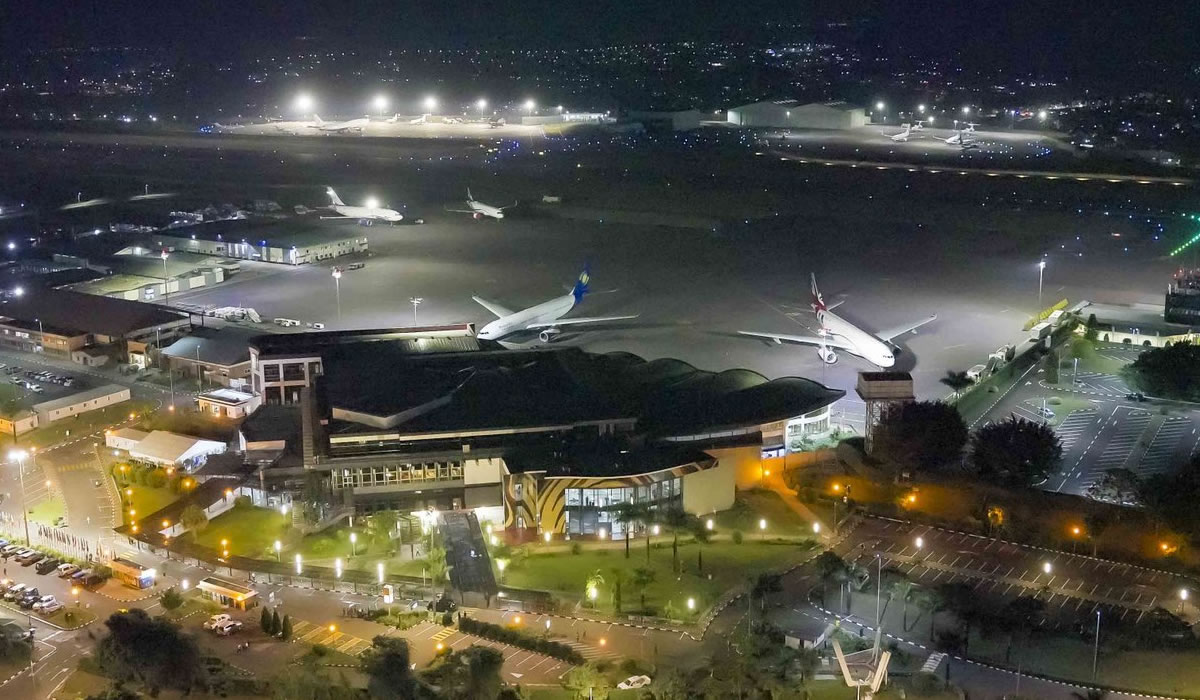Gorilla trekking in Rwanda is one of the most extraordinary wildlife experiences on Earth. Nestled…

Kigali International Airport
Kigali International Airport, officially known as Kigali International Airport (KGL), serves as Rwanda’s primary gateway and stands as one of East Africa’s most modern and efficiently managed aviation hubs. Located approximately 10 kilometers east of Kigali city center in the Kanombe sector, this strategically positioned airport has transformed into a crucial connector between East Africa, Europe, the Middle East, and beyond. Since its significant expansion and modernization, Kigali International Airport has become synonymous with Rwanda’s remarkable development story and its emergence as a premier destination for business and leisure travelers.
Airport History and Development
Kigali International Airport’s journey from a modest regional facility to an international aviation hub reflects Rwanda’s broader transformation over the past three decades. Originally constructed during the colonial period, the airport underwent substantial redevelopment following Rwanda’s reconstruction after 1994. The most significant transformation occurred with the opening of the new passenger terminal in 2017, a state-of-the-art facility designed to handle increasing passenger volumes while maintaining the highest standards of safety, security, and customer service.
The airport’s strategic importance extends beyond national borders, positioning Rwanda as a key player in regional aviation connectivity. RwandAir, the national flag carrier, has established Kigali International Airport as its primary hub, launching routes that connect the heart of Africa with major global destinations. This development strategy aligns with Rwanda’s Vision 2050, which envisions the country as a middle-income economy with strong service sectors, including aviation and tourism.
Recent infrastructure investments have enhanced the airport’s capacity to accommodate larger aircraft and increased passenger traffic. The runway extension project, completed in phases, now allows the airport to handle wide-body aircraft including the Airbus A330 and Boeing 787 Dreamliner, opening new possibilities for long-haul connections and cargo operations that support Rwanda’s growing economy.
Terminal Facilities and Services
The modern passenger terminal at Kigali International Airport exemplifies contemporary airport design with its spacious layout, natural lighting, and efficient passenger flow systems. The terminal building incorporates traditional Rwandan architectural elements while meeting international aviation standards, creating a welcoming atmosphere that introduces visitors to Rwanda’s cultural heritage from the moment they arrive.
Passengers experience streamlined check-in processes through modern self-service kiosks and traditional counters staffed by multilingual personnel. The departure area features comfortable seating areas, free Wi-Fi throughout the terminal, and charging stations equipped with multiple plug types to accommodate international travelers. Business travelers particularly appreciate the executive lounges that offer quiet workspaces, complimentary refreshments, and premium amenities designed for productivity and relaxation.
Shopping and dining options within the terminal showcase Rwanda’s finest products and culinary traditions. The duty-free shops feature locally produced coffee, tea, handicrafts, and textiles that make perfect souvenirs or gifts. Restaurants and cafes serve both international cuisine and traditional Rwandan dishes, allowing travelers to experience local flavors during their transit. The terminal also houses essential services including banking facilities, currency exchange, medical services, and luggage storage for passenger convenience.
Security systems at Kigali International Airport employ the latest technology while maintaining efficient processing times. The airport has received recognition for its security protocols and passenger facilitation measures, contributing to Rwanda’s reputation as one of Africa’s safest travel destinations. Immigration procedures are typically swift and courteous, with electronic visa systems and regional integration agreements facilitating smooth entry processes for many travelers.
Airlines and Destinations
Kigali International Airport serves as a hub for RwandAir, which operates an expanding network of destinations across Africa, Europe, Asia, and North America. The national carrier’s strategic route development has positioned Kigali as a convenient transit point for travelers moving between different regions, particularly connecting East and Central Africa with international markets. Popular RwandAir destinations include London, Brussels, Mumbai, Dubai, Johannesburg, Lagos, Nairobi, and numerous other African capitals.
International airlines have increasingly recognized Kigali’s strategic value as a gateway to East and Central Africa. Major carriers including Qatar Airways, Turkish Airlines, Ethiopian Airlines, Kenya Airways, and Brussels Airlines operate regular services that provide global connectivity for both business and leisure travelers. These partnerships have expanded travel options while introducing healthy competition that benefits passengers through improved services and competitive pricing.
Regional connectivity remains strong with frequent flights to neighboring countries including Uganda, Tanzania, Kenya, Burundi, and the Democratic Republic of Congo. These connections support regional trade, tourism, and cultural exchange while facilitating travel for the large diaspora communities throughout East Africa. Charter services and cargo operations also utilize Kigali International Airport for specialized transportation needs, including humanitarian missions and commercial freight services.
The airport’s growing reputation for efficiency and reliability has attracted new airline partnerships and route announcements. Recent additions to the destination network reflect Rwanda’s increasing importance as both a final destination and transit hub, with particular growth in connections to major business centers and tourist markets worldwide.
Ground Transportation and Access
Transportation options from Kigali International Airport to the city center and other destinations throughout Rwanda are diverse and well-organized. The airport’s location along major road networks provides convenient access via multiple transportation modes, ensuring passengers can choose options that best suit their budgets and preferences.
Official airport taxis provide reliable transportation with fixed pricing structures that eliminate negotiation concerns. These vehicles undergo regular safety inspections and driver certification programs that ensure professional service standards. Taxi services are available 24/7 and can accommodate various group sizes and luggage requirements, making them popular choices for international visitors unfamiliar with local transportation options.
Ride-sharing services and private car hire options have expanded significantly, providing competitive alternatives to traditional taxis. Many hotels and tour operators offer complimentary airport transfer services for their guests, particularly for longer stays or group bookings. These services often include meet-and-greet assistance and can be arranged in advance through accommodation providers or travel agencies.
Public transportation connections include bus services that operate between the airport and various city locations, though these options require more time and local knowledge to navigate effectively. For budget-conscious travelers familiar with local transportation systems, public options provide economical alternatives while offering authentic local travel experiences.
Practical Travel Information
Kigali International Airport operates efficiently across multiple time zones, with most international flights scheduled to optimize connections and minimize layover times. The airport’s 24-hour operations ensure that passengers can arrive and depart at virtually any time, though some services and facilities may have reduced availability during overnight hours.
Immigration and customs procedures at Kigali International Airport are generally straightforward for visitors with proper documentation. Rwanda’s visa policies have become increasingly traveler-friendly, with visa-on-arrival options available for many nationalities and electronic visa systems that expedite entry processes. Travelers should verify current visa requirements based on their nationality and purpose of visit, as policies can change with diplomatic developments.
Currency exchange services are available throughout the terminal, though rates may be more favorable at banks within Kigali city center. Major credit cards are widely accepted for airport purchases, and ATM machines provide convenient access to local currency. The Rwandan Franc is the official currency, though US Dollars are commonly accepted for tourism-related transactions.
Climate considerations should factor into travel planning, as Kigali’s high altitude and equatorial location create relatively stable temperatures year-round. The airport’s modern climate control systems maintain comfortable conditions regardless of external weather, though travelers should dress appropriately for their final destinations within Rwanda, which can experience significant temperature variations based on altitude and season.
Kigali International Airport represents Rwanda’s commitment to excellence in infrastructure development and international connectivity. This modern aviation facility successfully balances efficiency with cultural authenticity, creating positive first impressions while facilitating smooth travel experiences. Whether serving as a final destination or transit point, the airport’s continued development and expanding route network position it as an increasingly important hub in African aviation, supporting Rwanda’s economic growth and tourism development objectives while providing travelers with world-class airport services in the heart of East Africa.




